Each of us generates an average of 4.7-tonne CO2 emissions per year, the major cause of our climate problems. Mangroves are some of the most efficient green machines to help counter this, as one tree absorbs 673 kg of VCS CO2 over 25 years.
Further, each mature tree produces enough oxygen for four people. Mangroves also protect coastal lives and properties from extreme weather and increase ocean life by 50%, as well as the area’s general biodiversity. Starboard’s initial aim is to plant 100 million mangrove trees together with WIF, absorbing 67,3 million tons of CO2. There is a potential to plant over one billion mangroves on available land in Myanmar.
As other countries follow, with your help, our pioneering venture might become a milestone in human history.
What are mangroves?
Mangroves are the only trees that grow direcly in salt water. These salt-tolerant trees, also called halophytes, have evolved over time to thrive in harsh coastal conditions. They have an effective salt filtration system through their complex root structure, allowing them to fare well with salt water immersion and wave action. The low oxygen (anoxic) conditions of waterlogged mud help with their CO2 sequestration.
Why SOMWR chooses to plant Mangroves and not other trees?
Mangroves help the planet thrive in many ways! In the last few decades huge areas of mangrove forest have been slashed down for salt or shrimp farming or to be used as coal to fuel fires. With this rapid depletion comes many issues: Protecting the surviving forests will help to prevent these issues, but protection alone is not enough. If we do not support the reforestation of mangroves we will have to face the consequences globally.
The planets carbon cycle is the exchange of where the carbon dioxide is stored. Carbon is normally stored in carbon sinks in the ground. CO2 is released from the carbon stores in the ground or under the ocean through the change of land or the burning of fossil fuels.
Once this CO2 is released it goes into the atmosphere, increasing levels of atmospheric carbon and adding to the greenhouse gases which are now warming our planet and acidifying our oceans. The fastest way to restore carbon is through plant photosynthesis, where plants remove carbon from the air, store it in their trunks, roots and leaves and eventually sink it into the ground. photosynthesis also releases oxygen back into the atmosphere.
Additionally, mangroves live in oxygen-poor soils which means they work even harder to process the surrounding CO2.
Worldview International Foundation has the highest survival rate for trees, whilst also supporting the local community by creating jobs that provide a good income for planting and protecting the mangroves forests.
Why are mangroves so important?
As well as being incredible at natural carbon sequestration, Mangrove forests provide many additional benefits. They enhance biodiversity by creating nesting, breeding and nursery habitats for fish and shellfish, migratory birds, and sea turtles. This in turn supports local livelihoods by increasing fish stocks that providing higher yields for local fishing communities.
Local communities also benefit from the jobs created by the tree guardian and planting roles. Mangrove forests maintain water quality by trapping sediments and pollutants with their roots. Protecting fragile ecosystems such as seagrass meadows and coral reefs further downstream which could otherwise be damaged by pollutants or buried in loose sediment. Mangrove’s complex root structures are also a natural coastal defence against tsunamis and tropical storms, protecting the land and local communities.


